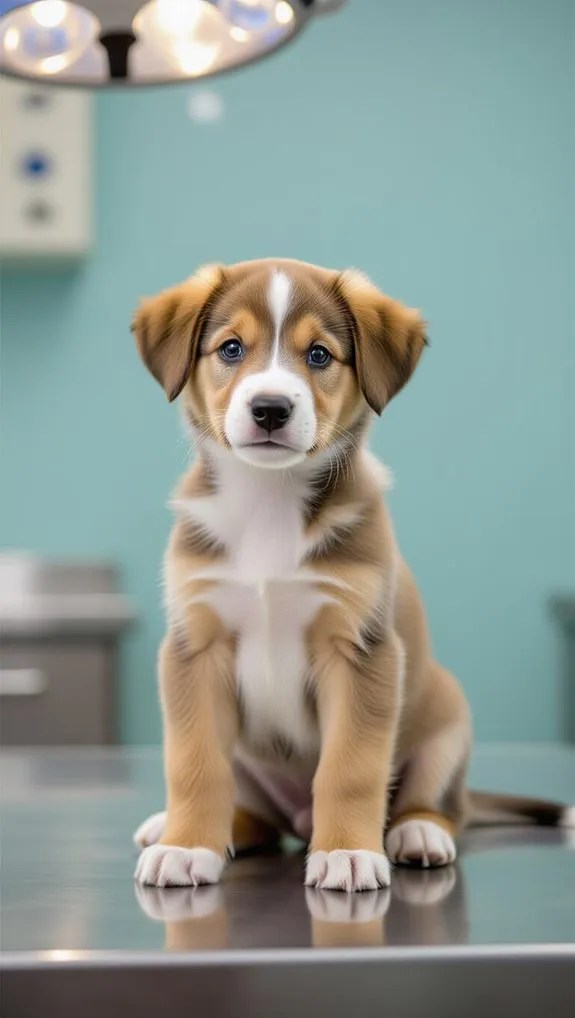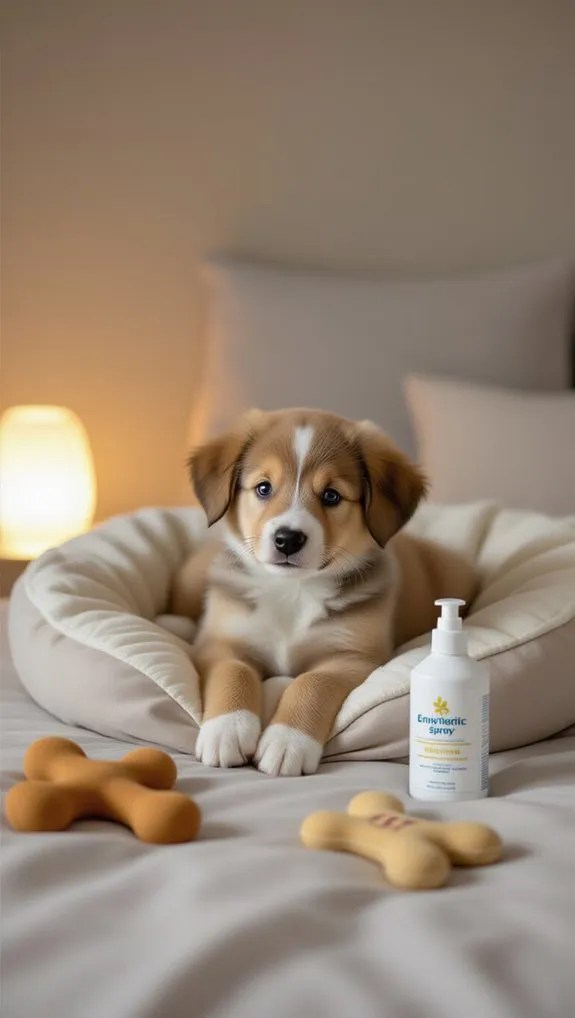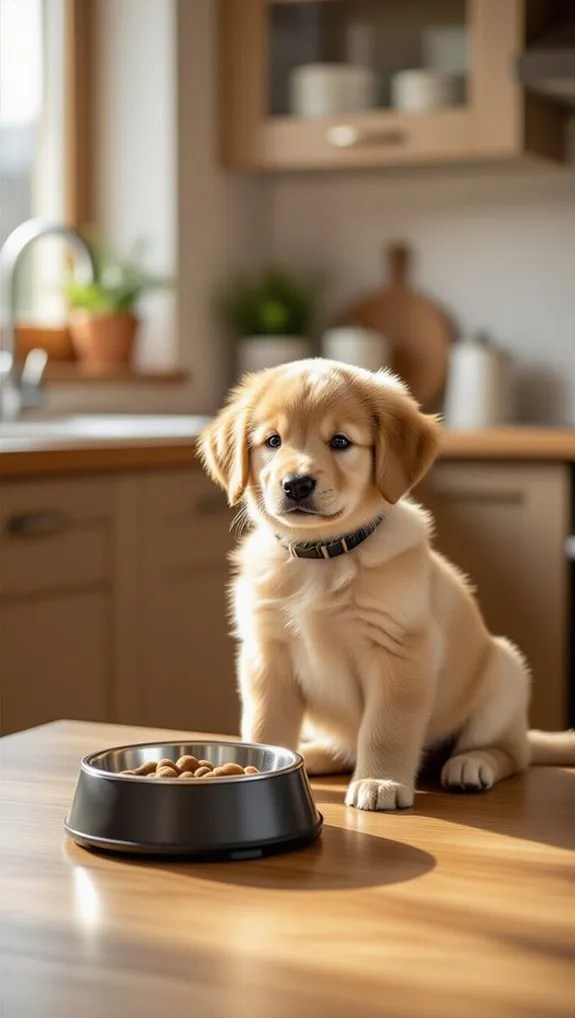Is your puppy eating poop overnight and turning your peaceful evenings into a nightmare? This disgusting habit affects countless dog owners, and you’re definitely not alone in dealing with this frustrating behavior. Whether it’s happening in their crate, around the yard, or during late-night potty breaks, coprophagia (the technical term for poop eating) can leave you feeling overwhelmed and grossed out.
The reasons behind this behavior range from nutritional gaps and boredom to natural instincts and attention-seeking. While it might seem impossible to break, there are specific strategies that work remarkably well for nighttime scenarios.
In this post, you’ll discover exactly why puppies develop this habit and learn proven methods to stop it quickly. I’ll share practical techniques for managing nighttime routines, environmental changes that make a real difference, and behavioral training tips that address the root causes-so you can finally enjoy peaceful nights without worrying about your pup’s disgusting midnight snacks.
Why puppies eat poop at night

While many puppy parents are baffled by their furry friend’s nighttime poop-eating habit, grasping the underlying reasons can help you address this common behavioral issue.
Puppies eat poop due to various factors like exploratory mouthing, separation anxiety, and unsupervised scavenging.
Nighttime coprophagia often stems from multi-dog households or shelter backgrounds where limited stimulation promotes opportunistic behaviors.
Nutritional deficiency can also trigger this habit, especially when puppies receive an inadequate diet lacking essential nutrients.
Clean-up and management are crucial in preventing this behavior, as bored or confined puppies are more likely to engage in this undesirable habit.
How to remove poop temptations fast

Grasping why your puppy eats poop is just the start-now you’ll want practical strategies to remove those tempting droppings fast.
When supervising your puppy, keep them on a short leash during bathroom breaks. Quickly pick up feces within seconds, blocking their access. Clean the yard multiple times daily, securing garbage and compost in sealed containers.
Use a microchip litter box or elevate cat litter to prevent access.
When you can’t immediately remove stool, bait and redirect with high-value treats. Reward the “leave it” command, guiding your puppy away from potential poop-eating temptations.
Best ways to supervise overnight potty breaks

Supervising overnight potty breaks becomes crucial when battling your puppy’s poop-eating habit. A strategic approach involving short leash control and scheduled nighttime trips prevents unwanted behavior. With careful crate placement and a headlamp for visibility, you’ll catch potential issues before they start.
| Supervision Tactic | Purpose | Key Action |
|---|---|---|
| Short Leash | Control | Limit Movement |
| Scheduled Breaks | Predictability | Prevent Accidents |
| Immediate Cleanup | Prevention | Remove Temptation |
Carry or harness your puppy during late-night outings, maintaining close supervision. Pick up feces instantly in a designated potty area, reinforcing good habits and stopping potential poop-eating behavior in its tracks.
Training your puppy to ignore poop

Training your puppy to ignore poop starts with teaching a reliable “leave it” cue that rewards good choices and redirects their attention.
You’ll want to use high-value treats as motivation, creating a powerful incentive for your puppy to look away from tempting waste.
Reward good choices
Consistently rewarding your puppy for making good choices is a powerful strategy in preventing coprophagia (poop eating) during overnight potty breaks. When you catch your puppy using “leave it” correctly, immediately offer high-value treats and enthusiastic praise. Practice a two-step routine: ask for a sit or recall after elimination, reward them for moving away from the stool, then clean up.
Regular impulse control exercises build self-discipline. Keep nighttime potty sessions short, use a leash, and be ready with rewards. Crate management can help prevent accidents when direct supervision isn’t possible.
Use “leave it” cue
Unleash the power of “leave it” to transform your puppy’s poop-eating habits and create a more disciplined companion. This critical training technique requires patience and consistent practice.
| Training Stage | Focus | Technique |
|---|---|---|
| Initial | Low distraction | Closed hand treat |
| Intermediate | Multiple environments | Variable reinforcement |
| Advanced | On-leash | Real-world distractions |
| Mastery | Generalization | Different stool types |
Start with short, frequent training sessions using high-value treats. Keep your puppy on-leash, give the “leave it” cue near feces, and immediately reward ignoring the temptation. Combine training with proactive management like picking up feces promptly and redirecting to toys, ensuring supervised learning and positive reinforcement.
Distract with treats
Most puppy owners will inevitably encounter the frustrating challenge of their furry friend’s fascination with feces, but strategically using treats can transform this undesirable behavior.
Keep your puppy on a short leash during walks, armed with high-value treats to distract and reward good choices. When you spot potential poop temptation, use the “leave it” cue and immediately offer a tasty alternative.
Practice a two-step routine: ask for a trained behavior like sit, then reward while quickly picking up the stool.
Consistent, reward-based training with frequent, short practice sessions will help your puppy learn to ignore feces.
Improving your puppy’s evening routine

When evening approaches, transforming your puppy’s routine can dramatically reduce nighttime coprophagia and create a more peaceful environment. By implementing strategic changes, you’ll help your furry friend avoid stool-eating behaviors.
| Evening Strategy | Key Action |
|---|---|
| Last Meal | 2-3 hours before bed |
| Post-Meal Walk | Short leash, encourage elimination |
| Overnight Confinement | Crate or puppy-proofed room |
| Calming Activities | Puzzle toy, quiet play |
| Immediate Cleanup | Remove fresh feces promptly |
A consistent, structured evening routine minimizes boredom and anxiety, reducing the likelihood of coprophagia. If problems persist, consult your vet to rule out underlying health issues.
Feeding and nutrition tips for less poop-eating

Tackle puppy poop-eating head-on by diving deep into nutrition strategies that can curb this unpleasant behavior. A well-balanced diet plays a crucial role in stopping stool-eating. Choosing a high-quality puppy diet with proper nutritional balance can reduce nutritional deficiencies that trigger this gross habit.
Increase your puppy’s feeding frequency to 3-4 small meals daily, which helps stabilize nutrient intake and reduces scavenging urges. Consider adding digestive enzymes or switching to more digestible kibble. Always consult your vet about potential underlying issues like parasites through a comprehensive fecal test to ensure your puppy’s optimal digestive health.
When to talk to your vet about poop eating

Because puppy poop-eating can signal serious health concerns, knowing exactly when to consult your veterinarian is crucial for your furry friend’s well-being.
When should you reach out to your vet about coprophagia? Consider these key moments:
- Sudden onset of persistent poop-eating behavior
- Weight loss or poor weight gain
- Presence of lethargy or gastrointestinal signs
- Multiple unsuccessful attempts to stop the behavior
- Accompanying symptoms like diarrhea or excessive hunger
Bring a fresh fecal sample for parasite testing and discuss potential nutritional deficiencies or pancreatic insufficiency.
Your vet can help diagnose medical causes and recommend safe, targeted treatments to protect your puppy’s health.
Frequently Asked Questions
How to Stop Puppies From Eating Their Poop Overnight?
I’ll prevent my puppy from eating poop overnight by crate training, removing waste immediately, scheduling consistent potty breaks, teaching “leave it” commands, and consulting my vet to address any underlying medical or nutritional issues.
Will My Puppy Eventually Stop Eating Poop?
Yes, most puppies naturally stop eating poop by nine months old. I’ll help speed up the process through training, immediate cleanup, and addressing any potential underlying health issues with my veterinarian.
How Do I Stop My Puppy From Needing a Poo in the Night?
I’ll help you stop nighttime pooping by establishing a consistent evening feeding schedule, taking final potty breaks before bed, and maintaining calm pre-sleep routines that regulate your puppy’s digestive system and elimination timing.
In Conclusion
Breaking the poop-eating habit takes patience, but you can stop puppy eating poop overnight with the right combination of strategies. Success comes through consistent training, proper nutrition, environmental management, and sometimes the help of deterrent products. Most puppies naturally outgrow this phase when provided with adequate mental stimulation, a clean environment, and immediate redirection when the behavior occurs.
While this challenging behavior can be frustrating, remember that coprophagia is common and treatable. Stay consistent with the techniques we’ve discussed – from increasing exercise and training sessions to using taste deterrents and maintaining a spotless yard. If the habit persists despite your best efforts, don’t hesitate to consult your veterinarian to rule out any underlying health issues.
Your dedication to addressing this behavior will pay off as your puppy develops healthier habits and better impulse control. For additional support in your training journey, check out our dog supply reviews to explore well-tested products including training treats, deterrent sprays, and interactive toys that can make the process more effective.










